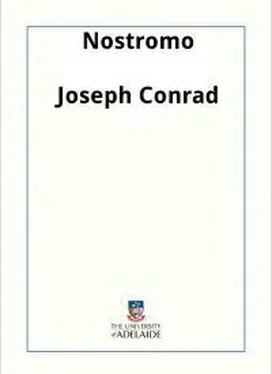Джозеф Конрад - Nostromo - A Tale of the Seaboard
Здесь есть возможность читать онлайн «Джозеф Конрад - Nostromo - A Tale of the Seaboard» весь текст электронной книги совершенно бесплатно (целиком полную версию без сокращений). В некоторых случаях можно слушать аудио, скачать через торрент в формате fb2 и присутствует краткое содержание. Год выпуска: 2006, Жанр: Классическая проза, на английском языке. Описание произведения, (предисловие) а так же отзывы посетителей доступны на портале библиотеки ЛибКат.
- Название:Nostromo: A Tale of the Seaboard
- Автор:
- Жанр:
- Год:2006
- ISBN:нет данных
- Рейтинг книги:4 / 5. Голосов: 1
-
Избранное:Добавить в избранное
- Отзывы:
-
Ваша оценка:
- 80
- 1
- 2
- 3
- 4
- 5
Nostromo: A Tale of the Seaboard: краткое содержание, описание и аннотация
Предлагаем к чтению аннотацию, описание, краткое содержание или предисловие (зависит от того, что написал сам автор книги «Nostromo: A Tale of the Seaboard»). Если вы не нашли необходимую информацию о книге — напишите в комментариях, мы постараемся отыскать её.
Nostromo: A Tale of the Seaboard — читать онлайн бесплатно полную книгу (весь текст) целиком
Ниже представлен текст книги, разбитый по страницам. Система сохранения места последней прочитанной страницы, позволяет с удобством читать онлайн бесплатно книгу «Nostromo: A Tale of the Seaboard», без необходимости каждый раз заново искать на чём Вы остановились. Поставьте закладку, и сможете в любой момент перейти на страницу, на которой закончили чтение.
Интервал:
Закладка:
“But, as a matter of fact, he managed somehow to escape the vigilance of his captors, who had tried to stop the communication with the outer world. He did manage it. How it was done I don’t know, but a few hours afterwards he called up Sulaco again, and what he said was, ‘The insurgent army has taken possession of the Government transport in the bay and are filling her with troops, with the intention of going round the coast to Sulaco. Therefore look out for yourselves. They will be ready to start in a few hours, and may be upon you before daybreak.’
“This is all he could say. They drove him away from his instrument this time for good, because Bernhardt has been calling up Esmeralda ever since without getting an answer.”
After setting these words down in the pocket-book which he was filling up for the benefit of his sister, Decoud lifted his head to listen. But there were no sounds, neither in the room nor in the house, except the drip of the water from the filter into the vast earthenware jar under the wooden stand. And outside the house there was a great silence. Decoud lowered his head again over the pocket-book.
“I am not running away, you understand,” he wrote on. “I am simply going away with that great treasure of silver which must be saved at all costs. Pedro Montero from the Campo and the revolted garrison of Esmeralda from the sea are converging upon it. That it is there lying ready for them is only an accident. The real objective is the San Tome mine itself, as you may well imagine; otherwise the Occidental Province would have been, no doubt, left alone for many weeks, to be gathered at leisure into the arms of the victorious party. Don Carlos Gould will have enough to do to save his mine, with its organization and its people; this ‘Imperium in Imperio,’ this wealth-producing thing, to which his sentimentalism attaches a strange idea of justice. He holds to it as some men hold to the idea of love or revenge. Unless I am much mistaken in the man, it must remain inviolate or perish by an act of his will alone. A passion has crept into his cold and idealistic life. A passion which I can only comprehend intellectually. A passion that is not like the passions we know, we men of another blood. But it is as dangerous as any of ours.
“His wife has understood it, too. That is why she is such a good ally of mine. She seizes upon all my suggestions with a sure instinct that in the end they make for the safety of the Gould Concession. And he defers to her because he trusts her perhaps, but I fancy rather as if he wished to make up for some subtle wrong, for that sentimental unfaithfulness which surrenders her happiness, her life, to the seduction of an idea. The little woman has discovered that he lives for the mine rather than for her. But let them be. To each his fate, shaped by passion or sentiment. The principal thing is that she has backed up my advice to get the silver out of the town, out of the country, at once, at any cost, at any risk. Don Carlos’ mission is to preserve unstained the fair fame of his mine; Mrs. Gould’s mission is to save him from the effects of that cold and overmastering passion, which she dreads more than if it were an infatuation for another woman. Nostromo’s mission is to save the silver. The plan is to load it into the largest of the Company’s lighters, and send it across the gulf to a small port out of Costaguana territory just on the other side the Azuera, where the first northbound steamer will get orders to pick it up. The waters here are calm. We shall slip away into the darkness of the gulf before the Esmeralda rebels arrive; and by the time the day breaks over the ocean we shall be out of sight, invisible, hidden by Azuera, which itself looks from the Sulaco shore like a faint blue cloud on the horizon.
“The incorruptible Capataz de Cargadores is the man for that work; and I, the man with a passion, but without a mission, I go with him to return—to play my part in the farce to the end, and, if successful, to receive my reward, which no one but Antonia can give me.
“I shall not see her again now before I depart. I left her, as I have said, by Don Jose’s bedside. The street was dark, the houses shut up, and I walked out of the town in the night. Not a single street-lamp had been lit for two days, and the archway of the gate was only a mass of darkness in the vague form of a tower, in which I heard low, dismal groans, that seemed to answer the murmurs of a man’s voice.
“I recognized something impassive and careless in its tone, characteristic of that Genoese sailor who, like me, has come casually here to be drawn into the events for which his scepticism as well as mine seems to entertain a sort of passive contempt. The only thing he seems to care for, as far as I have been able to discover, is to be well spoken of. An ambition fit for noble souls, but also a profitable one for an exceptionally intelligent scoundrel. Yes. His very words, ‘To be well spoken of. Si, senor.’ He does not seem to make any difference between speaking and thinking. Is it sheer naiveness or the practical point of view, I wonder? Exceptional individualities always interest me, because they are true to the general formula expressing the moral state of humanity.
“He joined me on the harbour road after I had passed them under the dark archway without stopping. It was a woman in trouble he had been talking to. Through discretion I kept silent while he walked by my side. After a time he began to talk himself. It was not what I expected. It was only an old woman, an old lace-maker, in search of her son, one of the street-sweepers employed by the municipality. Friends had come the day before at daybreak to the door of their hovel calling him out. He had gone with them, and she had not seen him since; so she had left the food she had been preparing half-cooked on the extinct embers and had crawled out as far as the harbour, where she had heard that some town mozos had been killed on the morning of the riot. One of the Cargadores guarding the Custom House had brought out a lantern, and had helped her to look at the few dead left lying about there. Now she was creeping back, having failed in her search. So she sat down on the stone seat under the arch, moaning, because she was very tired. The Capataz had questioned her, and after hearing her broken and groaning tale had advised her to go and look amongst the wounded in the patio of the Casa Gould. He had also given her a quarter dollar, he mentioned carelessly.”
“‘Why did you do that?’ I asked. ‘Do you know her?’
“‘No, senor. I don’t suppose I have ever seen her before. How should I? She has not probably been out in the streets for years. She is one of those old women that you find in this country at the back of huts, crouching over fireplaces, with a stick on the ground by their side, and almost too feeble to drive away the stray dogs from their cooking-pots. Caramba! I could tell by her voice that death had forgotten her. But, old or young, they like money, and will speak well of the man who gives it to them.’ He laughed a little. ‘Senor, you should have felt the clutch of her paw as I put the piece in her palm.’ He paused. ‘My last, too,’ he added.
“I made no comment. He’s known for his liberality and his bad luck at the game of monte, which keeps him as poor as when he first came here.
“‘I suppose, Don Martin,’ he began, in a thoughtful, speculative tone, ‘that the Senor Administrador of San Tome will reward me some day if I save his silver?’
“I said that it could not be otherwise, surely. He walked on, muttering to himself. ‘Si, si, without doubt, without doubt; and, look you, Senor Martin, what it is to be well spoken of! There is not another man that could have been even thought of for such a thing. I shall get something great for it some day. And let it come soon,’ he mumbled. ‘Time passes in this country as quick as anywhere else.’
Читать дальшеИнтервал:
Закладка:
Похожие книги на «Nostromo: A Tale of the Seaboard»
Представляем Вашему вниманию похожие книги на «Nostromo: A Tale of the Seaboard» списком для выбора. Мы отобрали схожую по названию и смыслу литературу в надежде предоставить читателям больше вариантов отыскать новые, интересные, ещё непрочитанные произведения.
Обсуждение, отзывы о книге «Nostromo: A Tale of the Seaboard» и просто собственные мнения читателей. Оставьте ваши комментарии, напишите, что Вы думаете о произведении, его смысле или главных героях. Укажите что конкретно понравилось, а что нет, и почему Вы так считаете.












